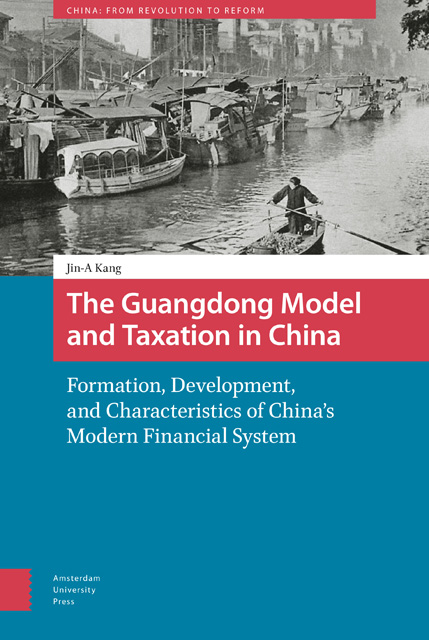 The Guangdong Model and Taxation in China
The Guangdong Model and Taxation in China Book contents
- Frontmatter
- Table of Contents
- Abbreviations
- Acknowledgments
- Introduction: The Modern Transformation of the Imperial Fiscal System: The Case of Provincial Finance in Guangdong
- Part 1 New Tax Revenues in Guangdong during the Republican Era
- Part 2 State-led Industrialization and the State Monopoly
- Part 3 Reform of Tax Collection
- Part 4 The Transition of the Modern Chinese Tax Structure in a Global Context
- Bibliography
- Glossary
- Index
10 - Afterword : Between Chinese Exceptionalism and Modern Fiscal State-building
Published online by Cambridge University Press: 10 January 2023
- Frontmatter
- Table of Contents
- Abbreviations
- Acknowledgments
- Introduction: The Modern Transformation of the Imperial Fiscal System: The Case of Provincial Finance in Guangdong
- Part 1 New Tax Revenues in Guangdong during the Republican Era
- Part 2 State-led Industrialization and the State Monopoly
- Part 3 Reform of Tax Collection
- Part 4 The Transition of the Modern Chinese Tax Structure in a Global Context
- Bibliography
- Glossary
- Index
Summary
Abstract
Chapter 10 belongs to the concluding part of the book that contains an overview of fiscal state-building efforts in modern Guangdong and a general evaluation of the experience of Guangdong in the context of China's process of financial modernization. As reviewing the experience of Guangdong, the modern fiscal state-building efforts should not be judged a success or a failure based solely on the standpoint of the central government. Despite a few features underpinning China's exceptionalism, the Chinese experience in the fiscal state-building beginning in the mid-nineteenth century was a process of convergence with the modern model in the rest of the world. Modern nation-building was strategically promoted as part of its catch-up development.
Keywords: China, Guangdong model, fiscal state-building, tax structure, Chinese model
China recently joined the group of G2 countries, alongside the United States, but the Chinese model has been offered as an alternative to the Western model. The Beijing consensus includes not only other political and socioeconomic options but also cultural and philosophical replacements. Professor R. Bin Wong argues that the traditional China of the Ming and Qing dynasties has something in common with today's welfare state. By examining Chinese notions of good governance (shanzheng), based on light taxation and the provision of social goods – pursued between 1500 and the mid-nineteenth century – and the pre-1850 success of this ideological state-operation, he finds that, ideologically, the traditional Chinese state was a transcendental arbitrator between contradictory interests among social groups and played the role of agency to flatten social inequality.
Meanwhile, to win routine wars, Europe gradually created militaryfiscal nations and developed a technique for fiscal operations of modern states by adopting indirect taxes, such as commercial and excise taxes, and raising finance from the private sector and overseas capital markets by issuing bonds. This model contrasts sharply with that of the Chinese moral economy where it is not permitted for the state to “contend with the people for interests.” Superficially, this Chinese large-scale granary system to relieve famine and the fiscal subsidy system to move finances between the rich and poor provinces is similar to the current welfare state.
But what about the reality? According to the governing philosophy of the Chinese empire, the widening of wealth inequalities often led to rebellion and turmoil.
- Type
- Chapter
- Information
- The Guangdong Model and Taxation in ChinaFormation, Development, and Characteristics of China's Modern Financial System, pp. 245 - 258Publisher: Amsterdam University PressPrint publication year: 2022
